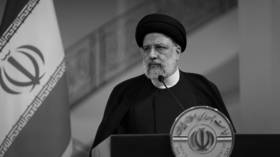Ebrahim Raisi and other top officials were killed in a helicopter crash on Sunday
There were initial fears among US officials that the helicopter crash that killed President Ebrahim Raisi on Sunday could trigger a new world war, Politico reported on Monday. In particular, there were concerns that Tehran could seek to blame Washington and Israel for the incident, a source told the outlet.
The helicopter carrying Raisi and his entourage, including Iranian Foreign Minister Hossein Amir-Abdollahian, went down on Sunday in the country’s northwestern East Azerbaijan province. The president had been returning from a meeting with his Azerbaijani counterpart, Ilham Aliyev, after they inaugurated a major dam project on the border.
According to the IRNA news agency, the aircraft crashed due to a “technical failure,” while rescue operations were hampered by adverse weather conditions, including fog and rain.
In the aftermath of the incident, the White House is closely monitoring how Iran will react to Raisi’s death, Politico noted, adding that unnamed senior US officials do not expect any significant policy changes from Tehran.
However, as the news of the crash broke, US officials “spent Sunday anxiously awaiting updates” on the situation. According to Politico, they were waiting to see if Iran would accuse Israel or Washington of sabotaging the helicopter, even though there was nothing to suggest this.
One unnamed official told the outlet that “for a little while, it was not a crazy question to ask ‘Is this how World War III begins?’”
US Defense Secretary Lloyd Austin has said his country played no role in the incident. Despite extremely tense relations with Iran, Washington offered “official condolences” and was willing to assist Tehran in the search operation, according to the State Department.
Referring to the crash, an unnamed Israeli official told Reuters that “it wasn’t us.” However, the chair of the Israeli opposition Yisrael Beytenu party, Avigdor Liberman, stated that West Jerusalem “won’t shed a tear” over Raisi’s death.
Iranian First Vice President Mohammad Mokhber is now acting as president, with a snap election scheduled for June 28. The Foreign Ministry in Tehran has insisted the deaths of Raisi and Amir-Abdollahian will not disrupt Iran’s international policies.
Tensions between Israel and Iran, archrivals for decades, escalated last month when Tehran accused West Jerusalem of killing several senior Iranian military officers in an attack on its consulate in Syria. In the days that followed, Iran launched a large-scale retaliation strike on the Jewish state involving hundreds of missiles and kamikaze drones.
You can share this story on social media:




